

The new guide World Travel: An Irreverent Information is credited to Anthony Bourdain. But it was not really penned by the bestselling writer, chef and Television set identity who died in 2018.
Entire world Travel: An Irreverent Information was assembled by one of Bourdain’s associates, Laurie Woolever, dependent completely on his previous writings and an hourlong job interview performed shortly ahead of his death. Bourdain had collaborated with Woolever on 2016’s Appetites: A Cookbook, and this task was conceived of soon thereafter, she claims, with the intent to spotlight some of Bourdain’s most loved places all around the globe.
Supplied the dearth of authentic creating by Bourdain himself, Environment Travel has a handful of tributary essays, by the likes of Bourdain’s brother Christopher, music producer Steve Albini, and Nari Kye, who labored as a creation manager on Bourdain’s Tv set display, No Reservations. She describes, in her essay, how her previous manager profoundly transformed her daily life.
“The South Korea episode of No Reservations commenced as a joke,” she writes. “At the conclusion of Season 1, I mentioned, ‘We’re all going to try to eat Korean barbecue, and drink plenty of soju.’ I acquired us a massive desk in Manhattan’s K-city, and Tony came. We went outside to smoke, and in my drunken soju haze, I stated, ‘Tony, you have to swear you are going to Korea.’ And he explained, ‘Of class. And you have to appear with me.’ “
What took place just after that drunken discussion was not a joke, Kye says.
“It really is hard not to get emotional when I speak about Tony,” she claims, wiping absent tears throughout a Zoom simply call from her Brooklyn household. Kye describes she was stunned not just to appear alongside for the South Korea episode, which aired in 2006, but also to be its concentrate, alongside with her family members there.

The exhibit follows Kye and Bourdain as they examine Seoul’s well-known Noryangjin fish market, pay a visit to a village well-known for its kimchee, peer at troopers guarding the DMZ and consume copiously at a karaoke bar. (Off-digital camera, Kye suggests, Bourdain performed a Billy Idol quantity.) The two sat down with Kye’s grandfather around a bowl of spicy fish stew as portion of the episode. He described the trauma of escaping from his residence in what is now North Korea in 1951.
“If I could go again there at the time prior to I die,” her grandfather explains in Korean, “I would have no other wish, if I could just see my parents’ graves and just cry my heart out. There is very little that can be accomplished, though. Which is just the way it is. That’s my fate.”

Kye and Bourdain hear, rapt. “I could possibly not have uncovered these matters had it not been [for] Tony and the show,” Kye mused to NPR. “I was one individual ahead of I created the present. I was a unique person later on.”
As she recounts in her essay, Kye did not mature up emotion proud of her family’s historical past or culture.
“I moved to the States when I was 5, from Korea, and immediately after that, I lived in a predominantly white, Anglo-American neighborhood,” she writes. “As a child who currently looked distinctive from everyone else, I was seeking to fit in as an American and was mortified by my Korean heritage. My mother cooked only Korean foodstuff. My dad and mom spoke only Korean to me … We in essence lived in Korea in our property in a quite American city.”

Right before Kye’s close friends would arrive about — “white, blond-haired girls named Jenny and Erin who would put on footwear inside their homes” — she would cover every thing in her property that seemed Korean. She was a latest college graduate, even now in her early 20s, when she traveled to South Korea with Bourdain. His full-throated enthusiasm for Korea’s magnificent historical past, tradition and meals transformed her viewpoint about some thing she had dismissed and taken for granted — and ignited her have perception of artistic probable. Now Kye works on a kid’s television display for Korean American people, and she’s producing an autobiographical screenplay, which includes her travels with Bourdain, filtered by finding out about food items.

Laurie Woolever and Anthony Bourdain at the Aqueduct Racetrack in Queens, N.Y.
CNN/Ecco
disguise caption
toggle caption
CNN/Ecco

Laurie Woolever and Anthony Bourdain at the Aqueduct Racetrack in Queens, N.Y.
CNN/Ecco
“I failed to know this had been so critical to Nari right until just after [Bourdain] died, and we had been speaking about his effects on us,” Laurie Woolever told NPR. “Experienced Tony lived and published his very own essay for the guide — which was the first system — I never would’ve gotten to listen to from Nari. And I feel it can be vital, and I want people today to realize how deep [Bourdain’s] legacy is.”
Section of that legacy, says Nari Kye, comes from how Bourdain reflexively stood up for underdogs, his embrace of individuals who get marginalized. “He generally built persons experience like they belonged,” she says.
And where ever he traveled, she says, Anthony Bourdain managed to belong as perfectly.

